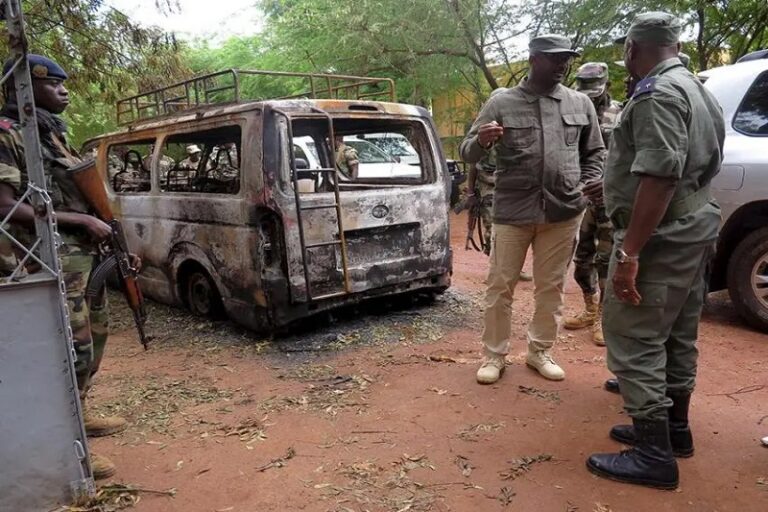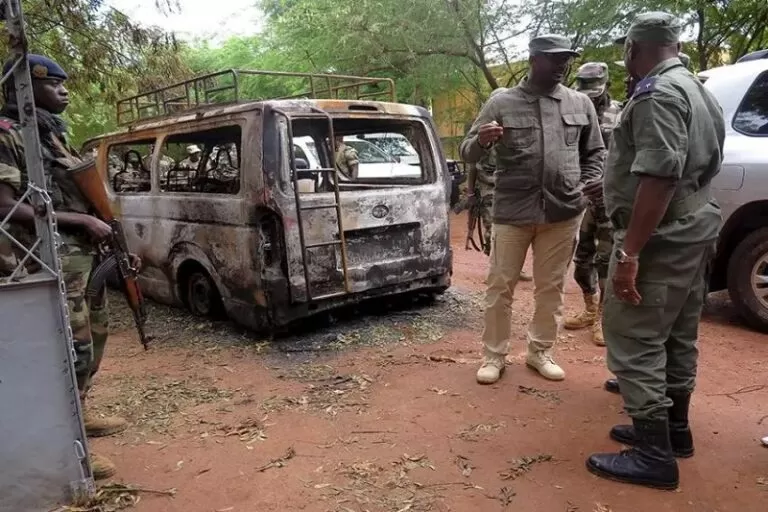

at least 13 villagers were allegedly killed in an attack by jihadists in mali.
An attack on a village in the central region of Mali that is being blamed on jihadists has resulted in the deaths of at least 13 civilians, according to statements made by local authorities on Friday. The assault on Kani-Bonzon on Thursday took place not too far from the border with northern Burkina Faso, which has been the site of numerous attacks that have claimed the lives of at least 70 soldiers and a dozen civilians in the span of less than a week.
The Islamic State organization has taken responsibility for carrying out at least one of those attacks, which resulted in the deaths of at least 51 soldiers. In Kani-Bonzon, according to a statement made by a local official to the AFP news agency, terrorists torched huts and granaries and abducted three people before fleeing the area.
According to another official, local residents who were not present at the time of the incident are now too terrified to return. A third official from the neighboring town of Bandiagara stated that the assailants had also taken cattle as part of their crime spree. According to him, on Friday there was a demonstration in the village calling for increased safety measures.
Since the beginning of independence movements and jihadist uprisings in the north in 2012, Mali has been thrown into a severe security and political catastrophe that has only gotten worse. Jihadist organizations with ties to al-Qaida or the Islamic State have expanded their operations to include the country’s center as well as the neighboring countries of Burkina Faso and Niger. The bloodshed in the region has resulted in the deaths of thousands of civilians as well as combatants and has caused the displacement of hundreds of thousands.
Since 2015, when the al-Qaida-affiliated Macina Katiba group established a stronghold there, the central region of Mali has been one of the primary hotbeds of violence in the Sahel region. An improvised explosive device, which is a common weapon used by terrorists, was responsible for the deaths of three Senegalese peacekeepers on Tuesday.
The appearance of the Macina Katiba has reignited or fanned the flames of long-standing hostilities between various groups over the distribution of available resources. The center is plagued not only by the abuses committed by jihadists but also by the retaliatory actions of communities against one another, the activities of self-defense organizations, and banditry.
Groups affiliated with Al Qaeda impose deals on the population that allow them to go about their business in exchange for paying a tax, accepting Islamic rules, and not collaborating with the Malian army or other armed groups. These deals allow the population to go about their business in exchange for paying a tax. Late in 2021, the junta that has been in control in Bamako since 2020 began a large-scale operation in the center of the country. This occurred around the same time that the junta severed ties with its long-standing ally France and began to strengthen its relationship with Russia.
The junta claims that some of the participants in the offensive in the center are Russian army instructors. However, the junta’s opponents claim that some of the participants in the offensive are mercenaries from the private Russian company Wagner. Wagner’s actions have been criticized in other parts of Africa and around the world. However, getting your hands on trustworthy and independent information in such a distant and hazardous location can be challenging.
The junta is adamant in its assertion that it has coerced the terrorists into taking a defensive stance. However, according to a report that was issued by the United Nations in January, radical organizations were continuing to “expand their influence and acquire new recruits” in the center. Additionally, it stated that on multiple occasions “members of foreign security forces” had engaged in abuses, which appears to be a reference to the junta’s new allies.
Since the beginning of the year, members of the Islamic State in the Sahara organization have been focusing their efforts in the northwestern region of Mali. It is leading to intense battles between local armed groups and rivals associated with al-Qaida, which in turn are leading to the deaths of civilians and the massive displacement of populations.
As a result of the current circumstances, President Charles Michel of the European Council has declared that the state of Mali is “collapsing.” This week, a senior Western official, speaking to journalists under the stipulation of maintaining their anonymity, stated that “there is no longer a Malian state.” Michel’s statements, which Malian officials in charge of foreign affairs have said are part of a “disinformation campaign” against their country, have been refuted.
Also Read:- Top 10 Richest Cities In Africa 2023
The cricket authority in Zimbabwe will organize matches between top international teams in a major cricket event expected to succeed…
In 2025 the South African Social Security Agency (SASSA) announced its designated dates for social grant payments that benefits millions…
Africa is taking big steps by entering the global green technology manufacturing market to stop being just a supplier of…
Two mobile telecom leaders, MTN Group and Airtel Africa, joined forces to create a new digital infrastructure system throughout African…
South African President Cyril Ramaphosa defended his nation against claims of white discrimination made by tech magnate Elon Musk. After…
Hilton launched Signia by Hilton for its first appearance in Egypt and Africa through its hotel expansions. These hotels at…
This website uses cookies.